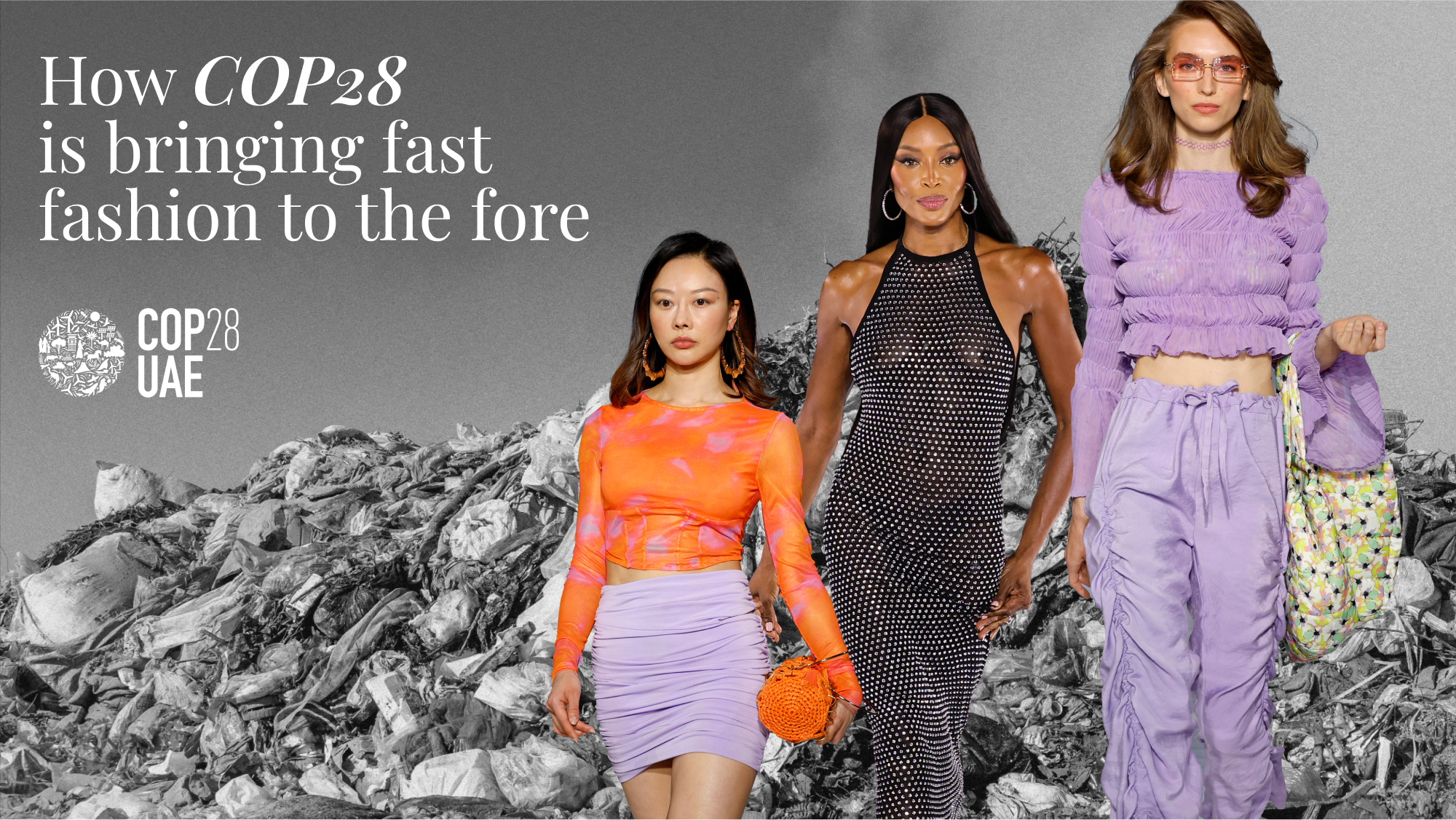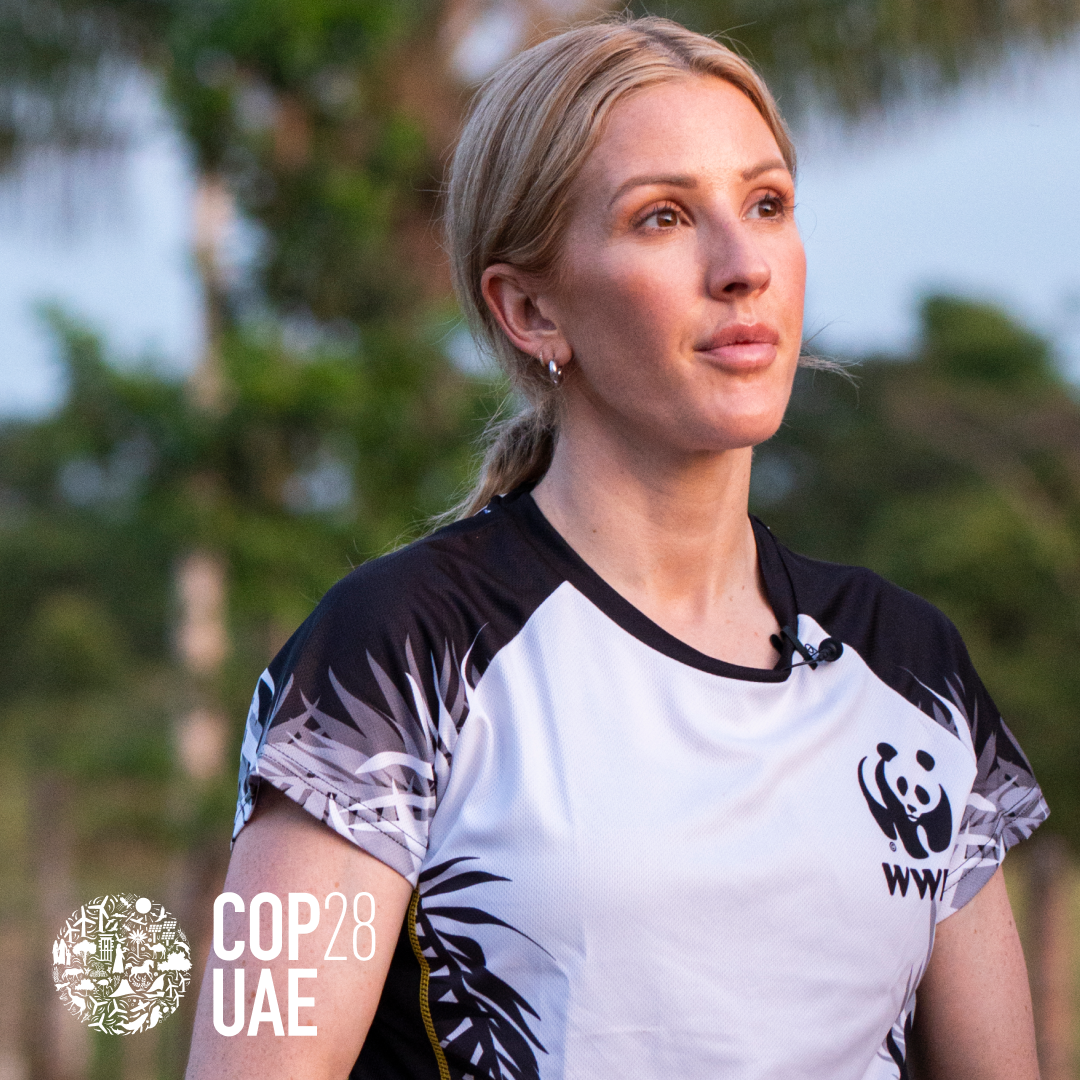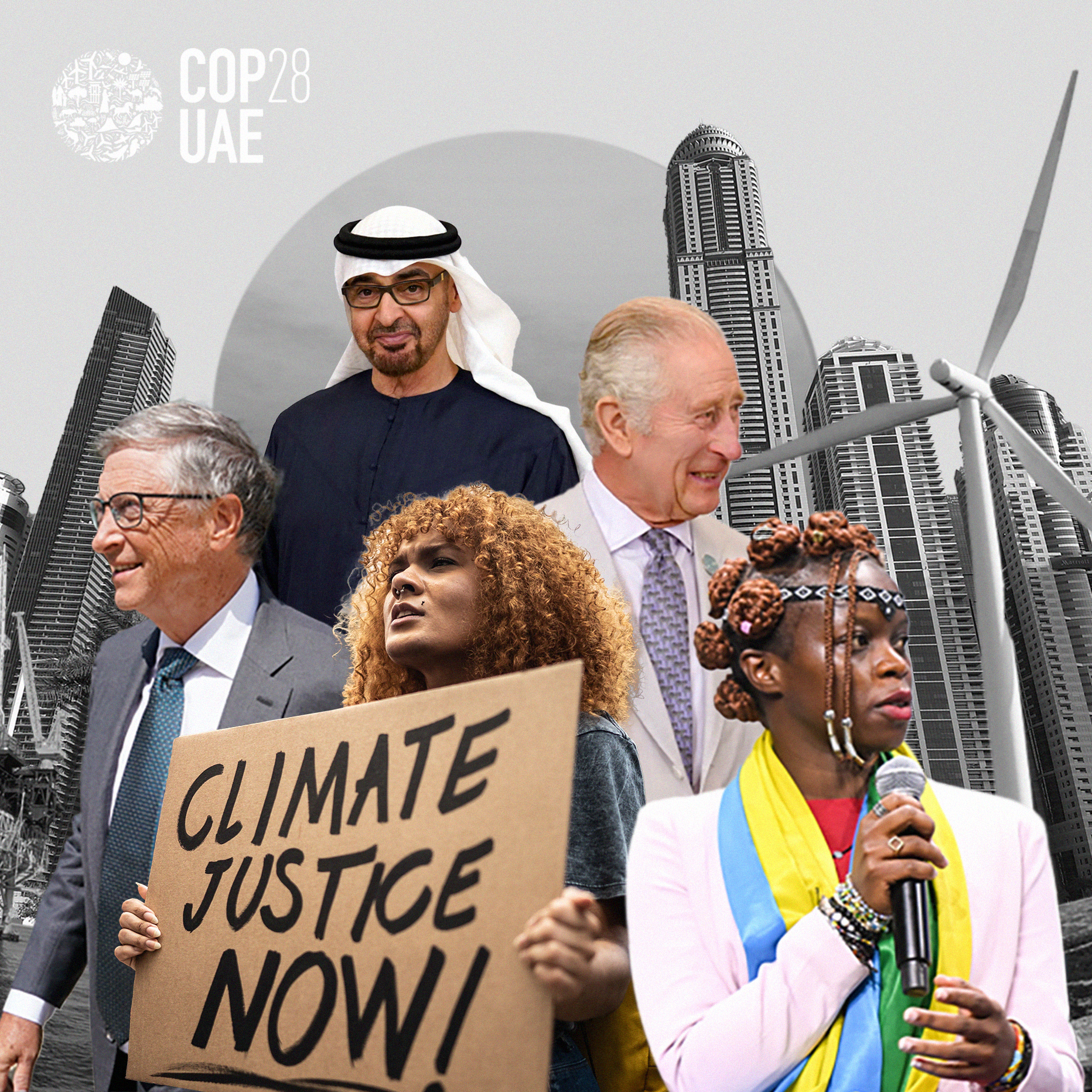I'm a Sustainability Expert who's been reporting on COP28 - one of the most interesting takeaways is about fast fashion
Plus, how this impacts you.


The annual climate conference COP28 has made global headlines this week. Now in its twenty-eighth year, it marks the week world leaders come together to agree on policies to limit climate change.
That said, for us at home, it can be hard to figure out how it actually impacts us as individuals. The conferences are hugely important for humanity as a whole, but even those already invested in sustainable living may find the headlines scary and jargon-heavy.
That's why, as a Sustainability Expert who's been reporting on the conference, I wanted to bring you the latest need-to-knows that will directly impact you. You'll have heard countries continuing to debate about phasing out - or phasing down - fossil fuels, but there have been some other big takeaways to note, too, that might feel closer to home.
One industry in particular that directly affects us all is fashion. Notably, its brasher sister, fast fashion, has been top of the agenda this week. To learn why and how this impacts you, keep scrolling.
COP28 is drawing to a close - and one of the key takeaways is about fast fashion
First, a bit of background for you. You might be shocked to read that fast fashion accounts for eight to ten per cent of global carbon emissions - shockingly, more than the aviation industry. What’s more, our synthetics obsession uses 342 barrels of oil a year, and cotton grown for our clothes takes up 2.5% of the world’s farmland.
To put it bluntly, we over-produce, under-wear, and throw too much away into landfill, even if it’s been through Vinted before it gets there. Earth.org reports that "of the 100 billion garments produced each year, 92 million tonnes end up in landfills."
That's because the making of our clothes requires huge energy commitments to power the factories, which are mainly found in the Global South. Think about it: from converting raw materials and oil by-products into textiles, to drying material, to stitching clothes, to packaging and then transporting the garments to retail outlets…and that’s before we start on the 92 million tonnes of textile waste created every year.
Marie Claire Newsletter
Celebrity news, beauty, fashion advice, and fascinating features, delivered straight to your inbox!
However, a 2023 report on the Global Fashion Agenda notes that there's certainly hope - if the right steps are made. "Improvements in energy efficiency and a transition from fossil fuels to renewable energy sources could deliver about one billion metric tons of emission abatement in 2030 across the fashion value chain," they share.
A post shared by FossilFuelFashion (@fossilfuelfashion)
A photo posted by on
Reducing fashion's footprint
Experts confirm that speeding up a transition to renewables is key to reducing fashion’s footprint. In a rare bit of good news, the EU is due to launch the Global Pledge on Renewables and Energy Efficiency at COP28, which has set global targets to triple the installed capacity of renewable energy and double the rate of global energy efficiency improvements by 2030.
It's a step in the right direction and comes as fashion’s reliance on fossil fuels and the amount of waste it produces continue to be one of the hottest talk points in the industry.
Just before COP28, the EU gathered sustainable fashion experts such as Ecoage CEO Livia Firth for the first time to discuss how products can be made in a less impactful way, how "waste" is managed in terms of textiles and overproduction, and what happens when your clothes are at the end of their lives. Essentially, the EU’s pioneering legislation will help move the mainstream fashion industry away from being linear (think buy, wear, bin) and towards being circular (instead, buy, wear, remodel, recycle, reuse).
Back at COP, there has also been a renewed focus on better climate finance and debt relief for developing countries such as Vietnam, Bangladesh and Pakistan, which are heavily involved in the fashion supply chain and also on the frontline of extreme weather events, such as flooding or high temperatures. 2023 was the hottest year on record. Of course, this isn't great news as that heat disrupts factories, making shifts unbearable or unworkable in countries like Vietnam. One report reckons that in Bangladesh, "a third of factories could be subjected to above-normal river and coastal flooding by 2030."
Fashion factories, like all factories in the Global South, are precariously placed, often near rivers to meet immense water needs. Many workers often live below the poverty line in homes that aren’t well-insulated or structurally strong. All it takes is a storm, which themselves are becoming more frequent and stronger, to cause huge damage, both to workers and the wider fashion industry.
Bottom line: climate funding is needed to speed up investment in alternative textiles and technologies that are less resource-intensive. Not just that, but investment in a "just transition" - which aims to tackle the social inequality that pervades the industry and is exacerbated by climate change - is key.
A post shared by Vogue Arabia (@voguearabia)
A photo posted by on
Climate funding and phasing out fossil fuels
Christie Miedema, campaigns and outreach coordinator for the Clean Clothes Campaign, agrees, highlighting that the apparel industry has been designed and built on inequality. She adds: “Not a single Bangladeshi garment worker in the supply chain of a major international brand receives pay that remotely resembles a living wage."
She goes on: "When asked about workers’ wages, brands often assure you that workers in their supply chain receive wages above the legal minimum. Yet in the context of the garment industry, where minimum wages generally constitute a quarter to a third of a living wage, paying above the minimum usually still means paying a poverty wage.”
Sure, climate funding and phasing out fossil fuels might not sound fashionable, but arguably they will influence the direction our favourite brands head in over the next few seasons. I for one am ready to support those businesses showcasing their authentic, transparent green commitments on the runway and beyond.
How can you show your support?
1. Support small
Support sustainable fashion brands that are pioneering new technologies and paying the workers in their supply chain fairly.
Not sure what to look for? Check a brand’s sustainability policy and look for certifications. B Corp brands and GOTS (Global Organic Textile Standard) clothes have all been ethically and sustainably produced.
I also love looking at Fashion Revolution’s #whomademyclothes hashtag for leading sustainable brands.
2. Pledge not to buy fast fashion, or only buy secondhand for a month
The new We Wear Oil campaign - which launched on Wednesday at COP28 - highlights how much of fast fashion is made from oil-based products.
Fossil fuel fibres will make up 73% of clothing textiles by 2030. One of the simplest ways to support the transition to a more circular industry is to pledge your support to phase out fossil fuels.
3. Share the brands on social
If you can't afford to support sustainable businesses financially, there's still a lot you can do to show your support. Even sharing their practices on social media to help them grow.

Georgina Wilson-Powell is a sustainability expert and author who ran a sustainable living magazine, pebble, for six years. Now, she focuses on sharing climate solutions that consumers can adopt and helps brands convey their sustainable impact. Her most recent book, 365 Ways To Save The Planet, is out now.
-
 Prince Harry's "proud" words about wife Meghan Markle are going viral
Prince Harry's "proud" words about wife Meghan Markle are going viralBy Jenny Proudfoot
-
 Sources have opened up about Timothée Chalamet and Kylie Jenner's "intense" start to the year
Sources have opened up about Timothée Chalamet and Kylie Jenner's "intense" start to the yearBy Jenny Proudfoot
-
 Two Hollywood actresses were offered the role of Carrie Bradshaw before Sarah Jessica Parker
Two Hollywood actresses were offered the role of Carrie Bradshaw before Sarah Jessica ParkerBy Jenny Proudfoot
-
 Ellie Goulding: "I was at COP28 - and despite the criticism, a lot happened that should be acknowledged."
Ellie Goulding: "I was at COP28 - and despite the criticism, a lot happened that should be acknowledged."As the twenty-eighth iteration of the climate conference draws to a close, the singer, WWF ambassador and activist reflects on her key takeaways.
By Ellie Goulding
-
 Climate activist Tori Tsui: "Only by working together do we really stand a chance against climate change."
Climate activist Tori Tsui: "Only by working together do we really stand a chance against climate change."She's an activist, author, and Greta Thunberg's friend - but most of all, she's someone demanding change.
By Ally Head
-
 As a Sustainability Editor - why COP28 is the most important conference to date
As a Sustainability Editor - why COP28 is the most important conference to datePlus, who will be attending this year.
By Ally Head